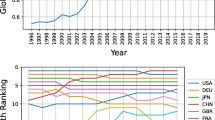Abstract
The network analyses reveal that extra-regional trade is indeed much more important for ASEAN, MERCOSUR, and SADC than intraregional trade, whereas intraregional trade clearly dominates the European network. Extra-regional trade partners have central positions in the trade networks of developing regions, and extra-regional trade flows dominate the picture. Thus, one may expect that the extra-regional interests of the regional member states are more important than the intraregional ones, and that they motivate and constrain regional integration in the developing world. Besides, the trade networks also demonstrate that two of the three developing regions are distinguished by large asymmetries and are dominated by one regional power. Brazil is clearly the dominant member state of MERCOSUR, whereas South Africa dominates SADC. In contrast, the economic weights of ASEAN’s member states differ, but none of them is so powerful in economic terms that it dominates the whole region. Brazil and South Africa are both important trade partners for their smaller neighbours, but they themselves trade predominantly with extra-regional partners like the EU and the USA. This asymmetric structure bears the risk of Rambo constellations, wherein the regional powers defect from regional integration in order to protect privileges in their extra-regional economic relations.
Access this chapter
Tax calculation will be finalised at checkout
Purchases are for personal use only
Similar content being viewed by others
References
Armstrong, D., Lloyd, L., & Redmond, J. (1996). From Versailles to Maastricht: International Organisation in the Twentieth Century. London: Palgrave Macmillan.
Brandes, U., Schneider, V., Wagner, D., Kenis, P., & Raab, J. (1999). Explorations into the Visualization of Policy Networks. Journal of Theoretical Politics, 11, 75–106.
De Lombaerde, P., Söderbaum, F., Van Langenhove, L., & Baert, F. (2010). The Problem of Comparison in Comparative Regionalism. Review of International Studies, 36, 731–753.
Dinan, D. (2005). An Ever Closer Union: An Introduction to European Integration. Basingstoke: Palgrave Macmillan.
Doctor, M. (2013). Prospects for Deepening MERCOSUR Integration: Economic Asymmetry and Institutional Deficits. Review of International Political Economy, 20, 515–540.
Estevadeordal, A., Goto, J., & Saez, R. (2001). The New Regionalism in the Americas: The Case of MERCOSUR. Journal of Economic Integration, 16, 180–202.
Feenstra, R. C., Lipsey, R. E., Deng, H., Ma, A. C., & Mo, H. (2005). World Trade Flows: 1962-2000 (NBER Working Paper).
Frankel, J. A., & Wei, S.-J. (1998). Open Regionalism in a World of Continental Trade Blocs (IMF Working Paper).
Fukase, E. (2003). Possible Dynamic Effects of AFTA for the New Member Countries. World Economy, 26, 853–872.
Haas, E. B. (1958). The Uniting of Europe: Political, Social and Economic Forces, 1950-1957. Stanford, CA: Stanford University Press.
Hafner-Burton, E. M., Kahler, M., & Montgomery, A. H. (2009). Network Analysis for International Relations. International Organization, 63, 559–592.
Hyde-Price, A., & Jeffery, C. (2001). Germany in the European Union: Constructing Normality. Journal of Common Market Studies, 39, 689–717.
Krapohl, S. (2008). Risk Regulation in the Single Market: The Governance of Pharmaceuticals and Foodstuffs in the European Union. Basingstoke: Palgrave Macmillan.
Krapohl, S., & Fink, S. (2013). Different Paths of Regional Integration: Trade Networks and Regional Institution-Building in Europe, Southeast Asia and Southern Africa. Journal of Common Market Studies, 51, 472–488.
Kreinin, M. E., & Plummer, M. G. (2008). Effects of Regional Integration on FDI: An Empirical Approach. Journal of Asian Economics, 19, 447–454.
Kruskal, J. B. (1992). Multidimensional Scaling. Beverly Hills, CA: Sage Publications.
Maoz, Z. (2009). The Effects of Strategic and Economic Interdependence on International Conflict Across Levels of Analysis. American Journal of Political Science, 53, 223–240.
Markusen, J. R. (2004). Regional Integration and Third-Country Inward Investment. Business and Politics, 6, 1082–1108.
Mattli, W. (1999). The Logic of Regional Integration: Europe and Beyond. Cambridge: Cambridge University Press.
Moravcsik, A. (1998). The Choice for Europe: Social Purpose and State Power from Messina to Maastricht. Ithaca, NY: Cornell University Press.
Nabers, D. (2003). The Social Construction on International Institutions: The Case of ASEAN+3. International Relations of the Asia-Pacific, 3, 113–136.
Oosthuizen, G. H. (2006). The Southern African Development Community: The Organisation, Its Policies and Prospects. Midrand: The Institute for Global Dialogue.
Pierson, P. (1996). The Path to European Political Integration: A Historical Institutionalist Analysis. Comparative Political Studies, 29, 123–163.
Rosamond, B. (2005). The Uniting of Europe and the Foundation of EU Studies: Revisiting the Neofunctionalism of Ernst B. Haas. Journal of European Public Policy, 12, 237–254.
Sandholtz, W. (1998). The Emergence of a Supranational Telecommunications Regime. In W. Sandholtz & A. Stone Sweet (Eds.), European Integration and Supranational Governance (pp. 134–163). Oxford: Oxford University Press.
Stone Sweet, A., & Sandholtz, W. (1997). European Integration and Supranational Governance. Journal of European Public Policy, 4, 297–317.
Tay, S. (2000). A New ASEAN in a New Millennium. Jakarta: Center for Strategic and International Studies and Singapore Institute of International Affairs.
Vaillant, M. (2005). MERCOSUR: Southern Integration Under Construction. Internationale Politik und Gesellschaft, 2, 52–71.
Veiga, P. L. d. M., & Marchisio, M. (2004). MERCOSUR’s Institutionalization Agenda. Buenos Aires: Institute for the Integration of Latin America and the Caribbean.
Walters, J. (1989). Renegotiating Dependency: The Case of the Southern African Customs Union. Journal of Common Market Studies, 28, 29–52.
Author information
Authors and Affiliations
Corresponding author
Editor information
Editors and Affiliations
Rights and permissions
Copyright information
© 2017 The Author(s)
About this chapter
Cite this chapter
Fink, S., Rempe, D. (2017). Trade Network Analyses. In: Krapohl, S. (eds) Regional Integration in the Global South. International Political Economy Series. Palgrave Macmillan, Cham. https://doi.org/10.1007/978-3-319-38895-3_4
Download citation
DOI: https://doi.org/10.1007/978-3-319-38895-3_4
Published:
Publisher Name: Palgrave Macmillan, Cham
Print ISBN: 978-3-319-38894-6
Online ISBN: 978-3-319-38895-3
eBook Packages: Political Science and International StudiesPolitical Science and International Studies (R0)




